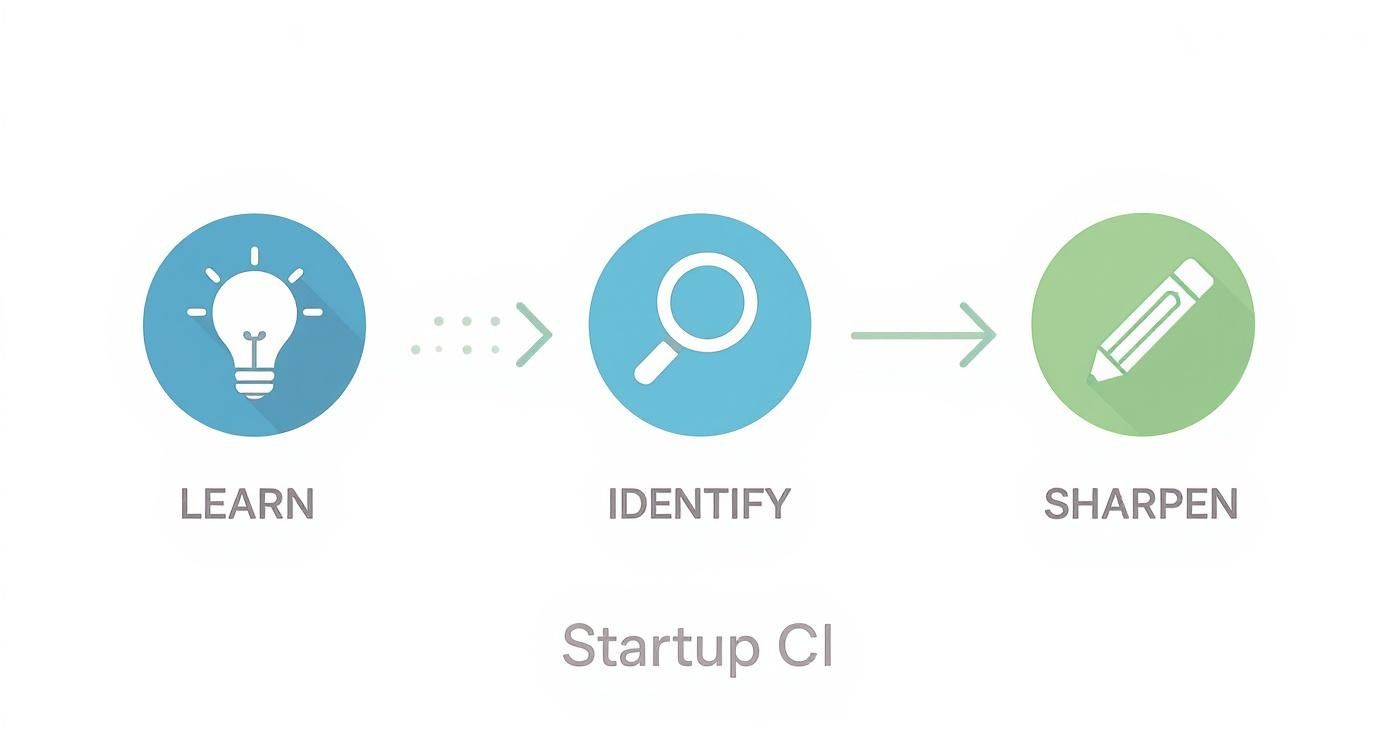
Forget the MBA-speak. For founders, Competitive intelligence (CI) isn't about dry reports; it's about survival. It's your startup's early warning system and opportunity radar, built by ethically gathering public information about your market and competitors to make faster, smarter decisions.
Think of it like this: A great boxer doesn't just watch tapes to copy their opponent. They study every detail—stance, tells, weaknesses—to anticipate their next move and find an opening. That’s what good CI does for your business. It’s not corporate espionage; it’s a systematic process that shifts you from just knowing who your competitors are to deeply understanding how they operate and why they make the moves they do.
What Is Competitive Intelligence, Really?

As a founder, you're constantly connecting dots. CI is the framework for that. You take scattered, public tidbits of information and weave them into a coherent story that reveals a clear picture of the battlefield. This isn't just for high-level strategy; it's about finding real, tactical advantages every single day.
- Smarter Product Development: Pinpoint gaps in competitor products that are driving their users crazy. We constantly scan subreddits for complaints about rival tools. Those pain points go straight into our product roadmap.
- Sharper Marketing Strategy: See what messaging works for others (and what doesn't). This helps you find underserved keywords, unclaimed topics, and unique angles to make your voice stand out.
- Stronger Sales Enablement: Arm your sales team with evidence. When they can speak to a competitor's pricing, known limitations, and negative customer reviews, they build a much more compelling case.
Competitive intelligence is the difference between reacting to the market and actively shaping it. It helps you build a proactive culture where every decision is informed by what's happening outside your own four walls.
A Non-Negotiable For Survival
In the early stages, every decision is monumental. You don't have the cash to build a product nobody wants or fight for scraps in an oversaturated market. For startups, CI isn’t a "nice-to-have"—it's a critical tool for survival.
There's a reason why roughly 90% of companies say that CI is crucial to their success. It transforms market awareness from a passive, occasional activity into a core driver of growth. For a closer look at the basics, our guide on competitor analysis for emerging businesses is a great place to start.
Competitive Intelligence From Theory To Action
To make this concept less abstract, let's break down how high-level intelligence translates into concrete actions and answers for you as a founder.
| CI Component | What It Means For You | Key Question It Answers |
|---|---|---|
| Market Landscape | Understanding the battlefield—who the players are, their market share, and the overall industry trends. | "Where do we fit in this ecosystem and what's changing?" |
| Product & Pricing | Analyzing competitor features, pricing models, and unique value propositions. | "How does our product stack up and are we priced correctly?" |
| Marketing & Sales | Deconstructing how competitors attract and convert customers through their messaging, channels, and tactics. | "What's working for them and where are the opportunities they've missed?" |
| Customer Sentiment | Monitoring what real users are saying about competitors on social media, review sites, and forums. | "What do their customers love, and more importantly, what do they hate?" |
This table shows how CI moves from a theoretical idea to a practical framework that informs every part of your strategy, from product development to your go-to-market plan.
Why CI Is Your Startup's Secret Weapon
As a founder, you're always working with a tight budget and very little room for error. Think of competitive intelligence (CI) not as a defensive shield, but as your best offensive tool. It lets you learn from your competitors’ blunders—like a bungled product launch or a pricing model that flopped—without having to make those costly mistakes yourself.
But good CI is about much more than just dodging bullets. It’s about spotting and grabbing opportunities before everyone else does. When you understand what your rivals are doing, and more importantly, what they aren't doing, you can find a whole new customer segment or a feature gap that your startup is uniquely built to fill.
This kind of insight is what helps you sharpen your unique value proposition. It’s how you make sure your message cuts through all the market noise and truly connects with your ideal customers, transforming you from just another choice into the only choice.
Moving From Reactive To Proactive
The single biggest shift that a solid CI process creates is in your mindset. Instead of constantly scrambling to react whenever a competitor makes a surprise announcement, you start to see market shifts coming. You learn to spot the patterns in their hiring, their content strategy, and their product updates, which gives you the time to prepare your own moves well in advance.
At its core, competitive intelligence transforms your startup from a market follower into a market leader. You stop playing catch-up and start setting the pace.
This proactive approach touches every part of your business, from your product roadmap to your go-to-market strategy. It makes sure every precious engineering hour and every marketing dollar is aimed where it will have the biggest impact. For example, using AI tools to monitor competitor mentions can show you exactly which features are causing their customers to leave, helping you prioritize your own development and even increase your lead generation by over 50%.
A Growing Market Underscores Its Importance
You don’t have to take my word for it—just look at the market. Businesses are voting with their wallets and investing heavily in tools to get this kind of competitive edge.
The competitive intelligence tools market was valued at $37.6 million back in 2019. It's now projected to more than double to $82.0 million by 2027, with North America leading the charge. This growth isn't just a random trend; it shows that founders and business leaders now see systematic CI as essential for growth. You can discover more about these market trends on Fortune Business Insights. This deliberate investment is what separates the startups that just survive from the ones that truly thrive.
Our Internal CI Playbook: The BillyBuzz Method
Theory is great, but execution is what matters. At BillyBuzz, we don’t have a massive intelligence department. We have a scrappy, founder-led process built for action, not for reports that gather dust. This is the exact playbook we run internally—a simple, four-stage loop you can replicate with minimal resources.
Our entire approach is about cutting through the noise to find clarity and then taking decisive action. This visual breaks down how we learn, identify opportunities, and constantly sharpen our competitive edge.

The flow from the lightbulb to the pencil says it all. Intelligence isn't a one-time discovery; it's a cycle of continuous refinement that sharpens your strategy over and over again.
Stage 1: Planning and Focus
Before we look at a single piece of data, we define exactly what we need to know. We toss out broad questions like, "What are our competitors doing?" and get laser-focused on queries that drive a decision.
- For Product: "Which feature gets the most complaints on Competitor X's G2 page?"
- For Marketing: "What pain points are people raising in r/SaaS that our top three competitors are missing?"
- For Sales: "What's the #1 reason we lose deals to Competitor Y, according to our CRM notes?"
This focus keeps us from falling down the rabbit hole of "analysis paralysis."
Stage 2: Scrappy Data Collection
Now for the tactical part. We don’t subscribe to dozens of expensive tools. We rely on a handful of high-signal sources.
The goal isn't to boil the ocean. It's to find the specific streams where your competitors' customers are speaking honestly.
Our go-to collection points are simple:
Targeted Google Alerts: We set up hyper-specific alerts. Instead of a lazy alert for
"[Competitor Name]", we use precise queries like"[Competitor Name] pricing" OR "[Competitor Name] reviews" OR "[Competitor Name] alternative". This filters for conversations with purchase intent.Subreddit Monitoring: We live on Reddit because it’s where you find unfiltered opinions. We use our own tool, BillyBuzz, to track keywords like "frustrated with [Competitor Tool]" or "looking for a tool that does X" in communities like r/SaaS, r/startups, and other niche industry forums. For example, a search for
"HubSpot alternative"on Reddit is a goldmine.Review Site Skimming: Once a week, we scan the latest 1, 2, and 3-star reviews for our main rivals on sites like G2 and Capterra. It's a goldmine for product gaps and service complaints.
Stage 3: Analysis and Action
Once we have the data, we don't build complex dashboards. We look for patterns in a simple document. Then comes the most critical step: turning insight into action.
- Insight: "We spot three different Reddit threads in one week complaining about a competitor's slow customer support."
- Action: "Our marketing team immediately drafts a blog post titled 'Why Fast Support is Non-Negotiable in [Our Industry]' and sends sales a Slack message with the following template: 'Hey, I saw you were looking for an alternative to [Competitor]. Many of their users mention slow support. We offer 24/7 chat with a <5 minute response time. Worth a look?'"
This process, from planning to action, is designed to be fast and repeatable.
The Modern Founder's CI Toolkit
You don't need an enterprise budget for world-class CI. Our stack at BillyBuzz is a mix of free powerhouses and affordable, targeted subscriptions. This isn't a theoretical list; it's what we use every day.
The market for these tools is exploding for a reason. Businesses are relying on real-time data to find their way through crowded markets.
Free Powerhouses for Daily Monitoring
The foundation of any lean CI system starts with free tools that put information gathering on autopilot. These are our non-negotiables.
Google Alerts: We use this for laser-focused tracking. Forget broad alerts for a competitor's name. We create super-specific queries like
"Competitor X pricing"or"Competitor Y alternative"to catch conversations with real purchase intent.Reddit & Niche Forums: This is where you find the raw, unfiltered truth. We manually scan subreddits like r/SaaS and other industry-specific forums for honest feedback, customer pain points, and new trends that formal market research often misses completely.
Social Media Listening (The Scrappy Way): No expensive tool needed to start. We create private Twitter lists that follow key competitor employees, their founders, and top industry journalists. This gives us a curated, real-time feed of market signals without all the noise from our main timeline.
Affordable Subscriptions for Deeper Dives
When you need to go beyond the surface, a few strategic subscriptions are worth their weight in gold. At BillyBuzz, our essential paid tools give us the deeper analytical power we need to turn raw data into strategic direction, all without breaking the bank.
We treat our CI tools like investments, not expenses. Each one must answer a specific, high-value question about our market, competitors, or customers. If it doesn't, we cut it.
For reverse-engineering a competitor’s marketing funnel or SEO strategy, a tool like Ahrefs is indispensable. We lean on it to see their top-performing content, map out their backlink strategy, and find keyword gaps we can jump on. It gives us a direct line into what’s already working with our target audience, which in turn shapes our entire content calendar. To equip yourself with the right resources for gathering insights, explore the best competitive intelligence tools available.
Our Founder-Friendly CI Tool Stack
Here’s a quick look at the core tools we use at BillyBuzz. We've built this stack to be lean, mean, and incredibly effective for startups that need to make every dollar count.
| Tool | Primary Use Case at BillyBuzz | Cost Level (Free/Low/Mid) | Founder's Pro-Tip |
|---|---|---|---|
| Google Alerts | Monitoring brand & competitor mentions | Free | Use "exact match" quotes for hyper-specific alerts. E.g., "slack alternative" |
| Uncovering authentic customer pain points | Free | Search for "[Competitor] alternative" for direct feedback. | |
| Ahrefs | SEO and content gap analysis | Mid | Use the "Content Gap" feature to find keywords competitors rank for, but you don't. |
| BillyBuzz | Automated Reddit & community monitoring | Low | Set up alerts for problem-specific keywords, not just brand names, to find sales opportunities. |
This simple combination allows us to cover a massive amount of ground—from high-level SEO strategy to on-the-ground customer conversations—without the overhead of an enterprise suite.
The Rise of AI-Driven Platforms
The next layer of our stack is all about AI. This is where we get a serious edge in speed and efficiency. Manually sifting through thousands of online conversations just isn't feasible for a small team, which is exactly why we built BillyBuzz to put our Reddit monitoring on autopilot. AI helps us slice through the noise to find incredibly relevant conversations about customer problems or mentions of our competitors.
These platforms are becoming essential for modern CI. If you're looking to build out your own AI-powered toolkit, check out our guide on 10 AI tools for competitor analysis in 2024.
By combining free monitoring with a few paid deep-dive tools and smart AI-driven analysis, you can build a formidable intelligence system that helps you outmaneuver even the biggest players in your space.
Turning Data Into Game-Changing Decisions

Information is noise until you use it to make a move. For us, competitive intelligence isn’t about building elaborate reports. It’s about drawing a straight line from a single data point to a concrete action that pushes the business forward.
The real magic happens when you can synthesize information from different places and turn it into a smart decision. Here are three real, anonymized stories of how we've turned small market signals into strategic wins.
From G2 Complaints To More Demos
We kept seeing a pattern in the 1- and 2-star G2 reviews for our biggest rival. Customers complained again and again that the tool's onboarding was clunky and confusing.
This was a glaring product gap. Instead of just filing it away, we acted fast. We made a complete overhaul of our own onboarding process our top priority, specifically designing it to be the exact opposite: simple and intuitive.
The result? We updated our website copy to specifically mention our "5-minute setup." Within a month, demo requests from people citing "frustration with [Competitor Name]'s setup" shot up by over 30%. We didn't just spot a weakness; we turned it into a lead magnet.
From LinkedIn Hiring To a Marketing Pivot
We keep a close eye on who our competitors are hiring. One day, we saw one of them suddenly post several senior-level openings for "Enterprise Account Executives" and "Solutions Architects."
That was a massive clue. This was a company that had always catered to small businesses. The new roles screamed that they were making an aggressive push upmarket.
A competitor’s job postings are their public roadmap. They tell you where they are going long before their marketing does.
Recognizing this early warning, we didn’t wait. We immediately tweaked our marketing to double down on our commitment to startups and SMBs. We positioned ourselves as the go-to solution for the exact customers they were preparing to leave behind, capturing that market share by simply reinforcing our core focus.
From Reddit Threads To Record-Breaking Content
Reddit is an incredible source for raw customer sentiment. We set up alerts to track a growing frustration in our niche—a very specific, technical problem that other tools just weren't handling well. We saw thread after thread pop up with users begging for a better solution.
This was a content goldmine. We saw a clear opportunity to become the number one resource on that topic.
Our team quickly put together an in-depth, ultimate guide that tackled the problem head-on. It provided a clear, step-by-step solution that, of course, subtly showcased how our product could help. That article became our highest-performing blog post of all time, driving thousands of organic visitors and cementing our authority in the space.
Each of these stories follows the same simple playbook: find a signal, connect it to a strategy, and execute.
We Hear These Questions About CI All The Time
When we talk with other founders, the same questions always pop up. The whole idea can feel fuzzy at first, so let's clear things up with some straight-to-the-point, founder-to-founder answers.
This isn't about academic theory. It’s about giving you practical advice you can put to work today.
How Is Competitive Intelligence Different From Market Research?
This one is simple. Think of market research as the wide-angle map of your industry. It’s fantastic for showing you the general lay of the land—market size, customer demographics, and major trends.
Competitive intelligence (CI) is like equipping yourself with high-powered binoculars. It's a specialized part of market research that lets you zoom in on the specific moves your rivals are making on that map.
Market research tells you a new trail is opening up on the mountain. CI tells you your biggest rival just sent a team to climb it, what gear they're using, and which route they're taking.
So, while market research might reveal that 75% of potential customers are looking for a new type of software, CI is what uncovers a Reddit thread where users are blasting your competitor's version for a critical bug. That's not just data; that's an opportunity.
What Are The Biggest Mistakes Startups Make With CI?
Hands down, we see founders fall into two classic traps: "analysis paralysis" or obsessing only over their competitors' successes.
Analysis paralysis is a real killer. It's being buried under a mountain of data—endless spreadsheets, competitor profiles—but never actually making a decision. The secret is to stop collecting everything and start focusing only on insights that help you answer a specific question.
The second mistake is ignoring your competitors' blunders. A rival's botched product launch or a pricing update that customers hated is a goldmine. It's a free lesson in what not to do. A smart CI program learns just as much from the market's "don'ts" as it does from the "dos."
How Much Time Should A Founder Really Spend On CI?
This is about consistency, not cramming. You don't need to block out entire days.
Just start with 30 minutes every Monday morning. That's it. Use that time to scan your key CI sources: your Google Alerts, a few relevant subreddits, or the latest reviews for your top rivals.
This small, steady habit is infinitely more powerful than a massive research project you do once a year. It builds a constant awareness that prevents you from ever being caught off guard. That tiny investment of time will easily put you ahead of 90% of your competition.
Ready to stop missing out on crucial conversations happening on Reddit? BillyBuzz uses AI to find new customers and track competitors in the communities that matter most. Start monitoring smarter, not harder.
